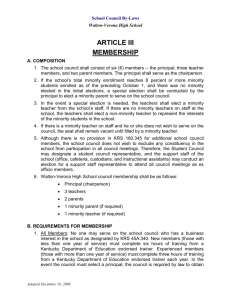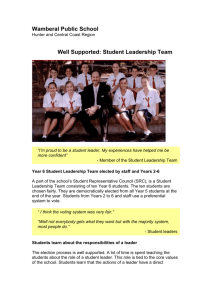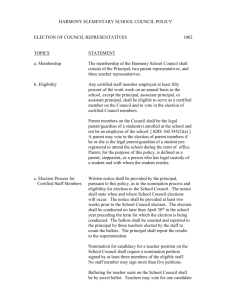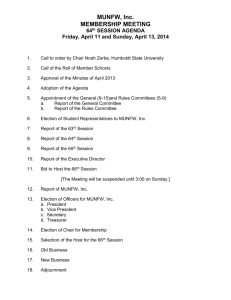By-laws - Mason County Schools
advertisement
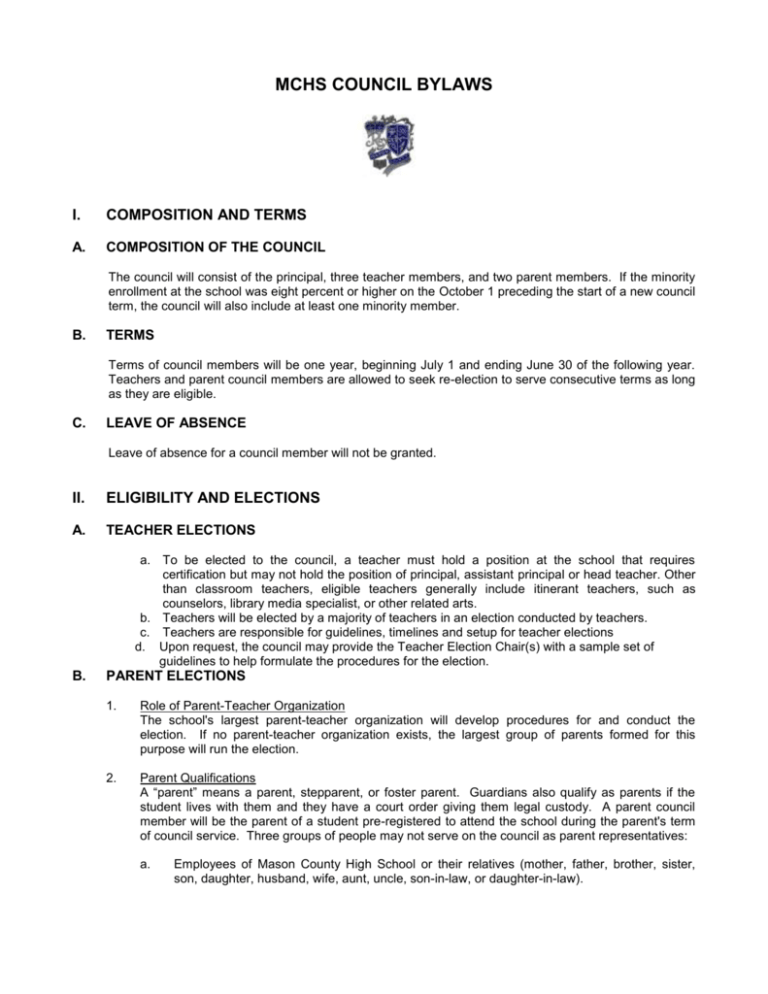
MCHS COUNCIL BYLAWS I. COMPOSITION AND TERMS A. COMPOSITION OF THE COUNCIL The council will consist of the principal, three teacher members, and two parent members. If the minority enrollment at the school was eight percent or higher on the October 1 preceding the start of a new council term, the council will also include at least one minority member. B. TERMS Terms of council members will be one year, beginning July 1 and ending June 30 of the following year. Teachers and parent council members are allowed to seek re-election to serve consecutive terms as long as they are eligible. C. LEAVE OF ABSENCE Leave of absence for a council member will not be granted. II. ELIGIBILITY AND ELECTIONS A. TEACHER ELECTIONS a. To be elected to the council, a teacher must hold a position at the school that requires certification but may not hold the position of principal, assistant principal or head teacher. Other than classroom teachers, eligible teachers generally include itinerant teachers, such as counselors, library media specialist, or other related arts. b. Teachers will be elected by a majority of teachers in an election conducted by teachers. c. Teachers are responsible for guidelines, timelines and setup for teacher elections d. Upon request, the council may provide the Teacher Election Chair(s) with a sample set of guidelines to help formulate the procedures for the election. B. PARENT ELECTIONS 1. Role of Parent-Teacher Organization The school's largest parent-teacher organization will develop procedures for and conduct the election. If no parent-teacher organization exists, the largest group of parents formed for this purpose will run the election. 2. Parent Qualifications A “parent” means a parent, stepparent, or foster parent. Guardians also qualify as parents if the student lives with them and they have a court order giving them legal custody. A parent council member will be the parent of a student pre-registered to attend the school during the parent's term of council service. Three groups of people may not serve on the council as parent representatives: a. Employees of Mason County High School or their relatives (mother, father, brother, sister, son, daughter, husband, wife, aunt, uncle, son-in-law, or daughter-in-law). b. c. 3. C. Employees in the district administrative offices or their relatives (mother, father, brother, sister, son, daughter, husband, wife, aunt, uncle, son-in-law, or daughter-in-law). Members of the Board of Education or their spouses. Parent Elections The parent elections will take place no later than May 1 st. The parents of all children pre-registered to attend the school during the next year may vote. The parent-teacher organization will determine how the election will be run. The principal will assist the parent-teacher organization in notifying parents of the election schedule. The parent-teacher organization will notify the current council of those elected not later than five school days after the election. MINORITY REPRESENTATION 1. A minority parent and an additional teacher will be elected, if the council formed (including the principal) after both teacher and parent elections does not have a minority member, and the school had eight percent or greater enrollment of minority students as of the previous October 1. 2. Minority members must be American Indian; Alaskan native; African American; Hispanic, including persons of Mexican, Puerto Rican, Cuban, and Central or South American origin; Pacific Islander; or other ethnic group underrepresented in the school. 3. The principal will be responsible for organizing the minority parent and teacher elections as follows: a. Following the general elections, if a minority member was not elected, the principal will organize a special election to elect a minority parent to the council. This election will be organized no sooner than ten and no later than twenty school days after the election (teacher or parent) which came last. The principal will notify all parents of the date, time, and location of the election. The notice will call for nominations of minority parents for the ballot. Minority parents for this ballot must meet the qualifications for parent members as outlined in subsection B of this section. At the election, parents may nominate additional minority candidates. The candidate receiving the most votes will be elected. In the event of a tie vote, a run-off will be held. b. Following the general elections, if a minority member was not elected, the Principal will call a meeting of all teachers in the building. This meeting will be called within seven school days after whichever election (teacher or parent) came last. The teachers will elect one minority teacher to serve as an additional teacher member on the council. If there are no minority teachers who are members of the faculty an additional non-minority teacher will be elected. If there are minority teachers on the faculty, but they decline to serve, then no additional teacher will be elected. The election will be conducted using the procedures listed in subsection A of this section. D. VACANCIES DURING A TERM OF OFFICE 1. Notice of Vacancy When either a teacher or parent vacancy occurs in the middle of a term, a new member will be elected to complete that term. The principal will post a notice in the faculty workroom and in a place readily accessible to parents stating that there is a vacancy and including the text of this subsection of the bylaws. The principal will also communicate this information to the president of the parent-teacher organization. These steps will be taken within one school day after the principal learns of the vacancy. 2. Election to Fill a Teacher Member Vacancy Within ten school days of the vacancy, the Teacher Election Chair(s) selected the previous March, will use the procedures established to conduct a teacher election to fill the vacancy. 3. Election to Fill a Parent Member Vacancy The president of the parent-teacher organization will call an election to be held not less than ten or more than twenty school days after the vacancy occurs. The procedures described in subsection B of this section will be used. 4. Election to Replace a Minority Parent Member The principal will implement the procedures described in subsection C of this section. 5. Election to Replace an Additional Teacher Member The principal will implement the procedures described in subsection C of this section. III. COUNCIL TRAINING A. NEW MEMBERS A member elected for the first time will complete a minimum of six hours of training in the process of school-based decision making no later than thirty (30) days after the start of his or her term. He or she can get that training any time between the date elected and the 30-day deadline. This training must be provided by a person endorsed by the Kentucky Department of Education. B. EXPERIENCED MEMBERS A member elected who has served on a council previously will complete at least three hours of training in the process of school-based decision making no later than one-hundred-twenty (120) days after the start of his or her term. This training may be obtained up to a year before the 120-day deadline. This training must be provided by a person endorsed by the Kentucky Department of Education. Experienced members may get training credit by attending any of the approved SBDM training workshops offered by endorsed trainers. C. MID-YEAR VACANCIES Members who are elected to fill a vacant position in the middle of the year will complete the required training no more than thirty (30) after they are elected. D. REPORTING By November 1st each year, the principal will ensure that names, addresses, and the training completed of each council member is reported to the Kentucky Department of Education. IV. STANDARDS OF CONDUCT A. ATTENDANCE Members of the council will attend all council meetings. If a member is unable to attend a meeting, he or she will notify the Chair of the Council. If a member is unable to attend on a consistent basis, the Chair of the Council will contact the member to consult and to discuss the possibility of resignation. B. CONFLICT OF INTEREST No one may serve on a school council who has a conflict of interest pursuant t KRS 45A [KRS 160.345(2)(a)]. A member who discovers a business or financial interest (not covered by KRS 45A) which may cause the appearance of impropriety should refrain from participating in any discussions or decisions involving those interest. C. ONGOING ELIGIBILITY Any member who ceases to be eligible to serve on the council will resign. D. IMPROPER MEETING Council members will not meet to discuss council business in a group that constitutes a quorum without following the procedures for scheduling a meeting of the full council in accordance with the Open Meetings Law and described in Section VI of these bylaws. E. INTENTIONAL INTERFERENCE WITH SCHOOL-BASED DECISION MAKING No member of the council will intentionally engage in a pattern of practice which is detrimental to the successful implementation of or which circumvents the school-based decision making process. V. REMOVAL OF MEMBERS A member who violates the standards of conduct and does not submit a written letter of resignation to the council could be reprimanded or removed in one of the following ways: A. COMMISSIONER’S RECOMMENDATION The Commissioner of Education can recommend removal for immorality, misconduct in office, incompetence, and willful neglect of duty or nonfeasance. The local board of education then holds a hearing into the charges to decide whether removal is warranted. B. OFFICE OF EDUCATION ACCOUNTABILITY The Office of Education Accountability (OEA) can investigate claims of intentional interference with school-based decision-making. If the OEA cannot resolve the issue, it is forwarded to the Kentucky Board of Education, which holds a hearing to determine whether the charges are valid. The first time the Kentucky Board finds a person guilty of such interference, the person will receive a reprimand. The second time, the person can be removed from office. VI. MEETINGS A. ALL MEETINGS 1. 2. Council meetings will comply with the requirements of the Open Meetings Law. Council meetings will be open to the public unless the council goes into closed session under the provisions of the Open Meetings Law. B. REGULAR MEETINGS At the first council meeting on or after July 1st each year, the council will designate a regular meeting time and place. The principal will post a copy of the regular meeting schedule on the school’s web site. He or she will use any other methods deemed appropriate to make the schedule readily available to the public. 1. 2. C. SPECIAL MEETINGS 1. 2. Any meeting not at the regular meeting time or place is a special meeting. A special meeting of the council may be called by the chairperson or by a majority of council members. Any special meeting of the council will comply with the requirements of the Open Meetings Law; therefore, the following steps will be taken: 3. a. Written Notice The person or persons calling the meeting will prepare and sign a written notice that states the date, time, and place of the special meeting and an agenda for the meeting. Only issues listed on that agenda may be discussed at the special meeting. Items may be subtracted from that agenda before approval at the meeting but they cannot be added or revised. Delivery Of Notice The person or persons calling the meeting will arrange for the written notice to be delivered to every council member and to any media organization that has made a written request to be notified of council meetings. The delivery can be made ONLY by hand, fax, US mail, or email. To receive email notification, a written request must be on file at the school. The notice will arrive at least 24 hours before the time set for the meeting. At the first meeting of each new term there will be an agenda item asking which members want to be notified about special meetings via email. The responses will be recorded in the minutes Posting Of Notice The notice will be posted conspicuously at the school, and also at the building where the meeting will be held if the meeting will not be held at the school. These copies will be posted as soon as possible after the meeting is called, but definitely no less than 24 hours before the meeting will be held. b. c. D. CLOSED SESSIONS The council may go into closed session only to discuss hiring personnel, or actual or pending litigation. The following procedures will be followed to go into a closed session: 1. 2. 3. 4. 5. 6. 7. E. A motion will be made and a vote taken that the council go into closed session to discuss individual applicants for hiring under KRS 61.810(1)(f) or litigation under KRS 61.810(1)(c). (See Attachment B) The motion and results of the vote including the statute number allowing the closed session will be recorded in the council minutes. People who have relevant or needed knowledge or information may be invited into a council closed session by a consensus of the council. Only the topic announced in the open session motion may be discussed in the closed session. No council action may be taken in a closed session. The council will return to open session to make any decisions. The decisions will be recorded in the council minutes. PUBLIC INPUT 1. 2. Every agenda will include a public comment item. Public input may be informal with the chairperson calling on persons who wish to speak. 3. If more than several people wish to speak, the chairperson will have the option of setting time limits for speakers based on the time allotted for this item, the number wishing to speak, and any extra time left on the agenda; or if the agenda will run over, by consensus of the members present to continue. VII. AGENDAS A. AGENDA REQUESTS Anyone may submit items for inclusion on the agenda to the chairperson. Items must be submitted no later than ten school days before a scheduled meeting. B. PRELIMINARY AGENDA The chairperson will prepare a preliminary agenda marked as such to be posted in the teacher’s lounge and in a place readily accessible to all parents and distributed to all council members at least five (5) school days before each regularly scheduled council meeting. Each preliminary agenda will include the following items: 1. Opening Business a. b. c. d. 2. 3. 4. 5. 6. 7. 8. C. Approval of the Agenda Approval of the minutes of the previous meeting Good News Report(s) Public Comment School Improvement Planning Report Budget Report Program Review Report(s) Other Committee Reports Bylaw or Policy Report or Review New Business List of items submitted but not on the agenda and their disposition (as needed) APPROVAL OF AGENDA At the beginning of each regular council meeting, the council will approve an agenda for the meeting. Items on the preliminary agenda may be added, deleted, or modified at this time. VIII. RECORDS A. LIBRARY COPIES At least one file of council records will be maintained by the school assistant principal and made available to the public. This file will contain copies of the council bylaws, all council policies, and council minutes for the current year, the current council budget, and the current School Improvement Plan. A copy of all SBDM information will be posted on the school web site. B. OPEN RECORDS REQUESTS The principal will be the official records custodian and will make the notebooks of council bylaws, policies, minutes, budgets, current SIP, and other council records available in response to written requests. A fee set by the Board of Education may be charged to cover copying costs other than staff time to make the copies in accord with the provisions of the Open Records Law. Persons who want copies of documents in the council binder will give the principal a written request. C. OFFICE COPIES All council records will be maintained in the school office in accordance with the State Archives Records Retention Schedule (725 KAR 1:030). (See Attachment C) IX. COUNCIL OFFICERS AND DUTIES A. CHAIRPERSON The principal will serve as the chairperson of the council. The chairperson will preside at all council meetings and carry out all other specific council duties as assigned by these bylaws. B. VICE-CHAIRPERSON 1. 2. The vice-chairperson will be chosen by consensus from within the council membership. The duties of the vice-chair will be to: a. Preside over council meetings in the absence of the Chair. b. Arrange training for the council on an agreed upon date/time in the event that a new principal must be hired including. Calling a special meeting for the training on the agreed upon date/time Inviting the superintendent (or designee) to attend the training Ensuring that all council members, the superintendent (or designee), and the trainer have a copy of the Principal Selection Policy. c. Become the liaison to the superintendent (or designee) when he/she becomes the chair of the council in the event that a new principal must be hired. (See Attachment D). C. RECORDER 1. The chairperson of the council will appoint a recorder for the council. 2. The duties of the recorder will be to: d. Take minutes at each council meeting that include an accurate record of all motions made and all decisions or actions taken. Maintain and up-date all documents in the public notebook in the library. e. Type, copy, and distribute the draft minutes, marked as such, to each member of the council and post a copy in the teacher's lounge and in a place readily accessible to all parents. This will be done within five school days after each meeting. f. Make copies of the final approved minutes for the notebooks in the library and the office and send copies to all council members, the president of the parent-teacher organization, and the superintendent. This will be done within five school days following the meeting at which the minutes were approved. X. COMMITTEES A. USE OF COMMITTEES Committees will be used to support and to accomplish tasks of the council. B. COMMITTEES POLICY The council will adopt a committees policy to facilitate the participation of interested persons. The policy will include the number of committees, their jurisdiction, their composition, and the process for membership selection. XI. DECISION-MAKING A. QUORUM A majority (more than half) of the members, including at least one parent member, will constitute a quorum. A quorum must be present for the council to take action. B. VISION & MISSION Decision-making will be guided by student needs and the school’s vision, as well as the overall mission of specific programs. When possible, decisions will be based on applicable data. When making decisions, the council will give priority to improvement plan goals and strategies. C. COUNCIL RESPONSIBILITIES The council will make no decisions on issues that are not under their jurisdiction by law. The following issues are under the purview of the School-Based Decision Making Council: 1. 2. 3. 4. 5. 6. 7. 8. 9. School Improvement Planning School Safety Plan Assessment Data Analysis, including results of Program Reviews Achievement Gap Targets Professional Development Spending on textbooks, instructional materials, student support, and staff (including determination of the number of persons to be employed in each job classification) Consultation before the principal selects people to be hired Selection of a new principal Adopting policies in the following areas: a. b. c. d. e. f. g. h. i. j. k. l. m. n. o. p. q. r. Alignment with State Standards College-Level Courses Committees Consultation Curriculum Discipline, Classroom Management and School Safety Enhancing Student Achievement Extracurricular Programs Instructional and Non-Instructional Staff Time Assignment Instructional Practices Parent Engagement (Title 1 Schools) Program Appraisal School Day and Week Schedule School Space Use Student Assignment Technology Use Writing OTHER: Policies not required by law but considered best practice and/or recommended by the local district. Following are activities in which councils should not be involved: 1. Run the school on a day-to-day basis 2. Break state/federal laws, risk lawsuits, or break contracts 3. Risk health or safety of students or staff 4. Spend money they don’t have 5. Make decisions outside the areas of responsibility listed above D. CONSENSUS 1. The council will operate by consensus decision-making using the following procedures: a. Only decisions that have an immediate deadline or will have very limited impact on the school will be made without a committee recommendation. b. All council members who choose to do so will be given a chance for input on issues requiring a consensus decision. c. E. 1. F. 2. After council input and discussion, any member may make a motion to accept a proposal. If the proposal being considered is in writing, the motion may be made verbally. If the proposal has not been presented in writing or the member making the motion wants to propose one or more amendments, he or she will write down the motion, read it to the council, and hand the written motion to the recorder for inclusion in the minutes. 3. The chair will then ask if there is further discussion. 4. When that discussion is complete, the chair will test for consensus by asking if there is consensus for approval of the motion. Any member who is not willing to support the motion is obligated to say so at this time. Members who support the motion will indicate by word or other sign that they believe there is now a consensus. 5. If no member states unwillingness to support, the chair will direct the recorder to record that consensus has been reached and the motion has passed. CONSENSUS FAILURE If the council takes up an issue and is unable to reach consensus, the council will vote if a quorum exists and the majority will determine if an issue passes. . ADOPTION OF POLICIES 1. 2. 3. G. If council input and discussion reveal significant concerns or ambiguities related to an issue, the council's normal practice will be to give or return the issue to a committee for further work. Exceptions may be made for urgent timelines or pressing concerns. Policies are defined as written documents that establish rules, procedures, guidelines, standards, or principles to guide decision-making in various situations. To be officially adopted, a policy will have a reading at two different council meetings. Adopted policies are binding until the council amends them. BYLAWS AMENDMENT The council may amend these bylaws as needed. All motions to amend the bylaws of the council will be submitted in writing. No decision on a motion to amend the bylaws will be made until after the topic has been on the agenda for two meetings and has had two readings. H. APPEALS OF COUNCIL DECISIONS The District Board of Education has established a process of appeals of council decisions. Adopted – 1/15/2014 SBDM members Dave Buchanan, Rob Kimble, Tom Cordingly, Laura Jefferson, Lamont Johnson, Principal Steve Appelman

